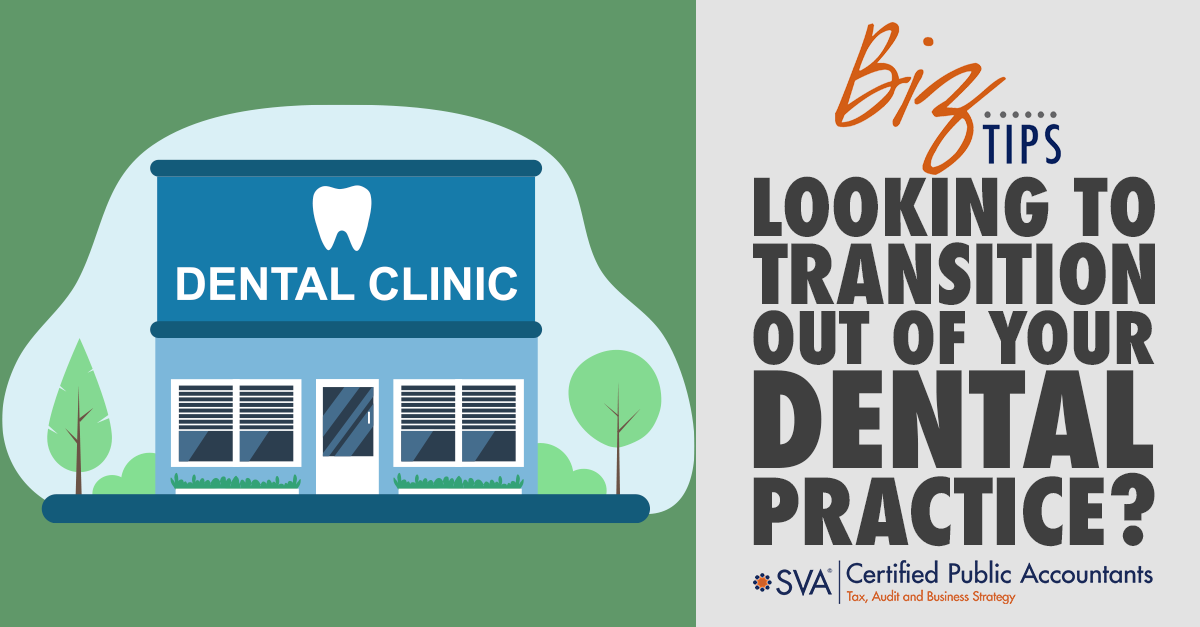| Highlights: |
- Outlines how dentists can plan and prepare for transitioning out of their practice, whether through sale or transition to an associate, emphasizing early preparation and evaluation.
- Describes key steps in the transition process such as practice valuation, marketing, negotiation, tax and payment considerations to protect financial goals.
- Emphasizes assembling a professional advisory team, including attorneys and CPAs, to guide due diligence and ensure a smooth transition.
|
Whether you are reaching the point of retirement or are transitioning to another stage in your career, planning and preparation will help with a smooth transition of your dental practice. From valuation to contract terms, there are many considerations to ensure you achieve your financial goals and objectives.
Presale Considerations
You have made the decision that it's time to start thinking about selling your dental practice. Congratulations! But the big question is whether your practice is ready.
- Is your practice production increasing or decreasing?
- Are your financial statements and records clean? Are they ready for the interpretation, scrutiny, and due diligence of a third party?
- Is your lease favorable or is it about to expire?
Selling your practice is a lot like selling your home. Taking the time to spruce it up will help you maximize the value upon sale.
Prepare your practice for sale three years before the ultimate time you desire to transition. Why three years?
Three years is the minimum time period that potential buyers will look back upon to review production, financial, and profitability trends. Trends are an important part of establishing the value or price of your dental practice. Upward trends in production and profitability can often command higher values in the marketplace.
Practice Transition Options
When the time comes to transition your practice, there are two main options:
1. Sale of Practice
There are three alternatives when choosing who to sell your practice to:
| Dentist |
You might decide to sell to a dentist who wants to own their own practice or relocate back to the area. |
| Consolidator |
This is an option that is generally very favorable to the seller. Often cash up front is part of the terms of the offer, though the details need to be understood and evaluated to ensure an equitable deal. |
| Group Practice |
There may be a group practice that wants to expand and is interested in purchasing your practice as part of that strategy. |
2. Transition to Associate
Alternatively, your transition plan may include an associate. This could involve a transition in ownership all at once or over time if you want to gradually wind down. This scenario may mean looking ahead so proactive planning is crucial to your success.
Steps in Selling Your Dental Practice
Regardless of which transition option you choose, here are the steps to selling your dental practice:
- Value of Practice – First, you'll need to value the practice and, as the seller, you will want to be the first person to put a price on it.
- Marketing Strategy – You can advertise in the WDA, the ADA, or you can work with a broker. Spread the word through dental supply reps or consultants to make it known that you are selling your practice.
- Negotiations – Once you get an offer, analyze it and examine the tax considerations and payment terms.
- Closing – Once both the buyer and seller are happy with the structure of the transaction, the closing of the practice can occur.
(Download Video Transcript)
What Are You Selling? Tangible vs. Intangible Assets
The first step in selling your dental practice is valuing it and determining the sales price. To calculate the value, think about what you are actually selling in your practice. What is there that is of value to someone else?
There are two categories of assets in your practice that determine its value:
| Tangible Assets |
These are assets you can touch, feel, and see (i.e., hard assets). Examples include accounts receivable, supplies, equipment, leasehold improvements, and the building if you own it. (PRO TIP: If you own the building, have a certified commercial real estate appraiser put a value on your building and the real estate.) |
| Intangible Assets |
This is everything else within the practice. Examples include goodwill, covenant not to compete, and the right to earn income off of a block of patients in the future. Typically, goodwill is a range between 100% to 150% of one year's net income before dentist compensation. |
Determining Practice Price
When determining the practice price, there are two ways to accomplish this:
| Valued as a Whole |
The practice price can be calculated based on a percentage of top-line collections. For example, a $1 million grossing practice might sell for 70% of collections or $700,000. |
| Valued by its Parts |
Practice price can also be calculated by totaling the price of the various components of the practice (i.e., accounts receivable, supplies inventory, equipment, goodwill, etc.). |
Regardless of the way it is priced, both the buyer and seller must come to an agreement before the transition can happen.
There are various factors that might impact the price you negotiate when you go to sell your practice. These include:
- Physical location of the practice
- Favorable long-term lease and/or option to buy real estate
- Physical condition of equipment and facility
- Doctor production and hygiene production ratios
- Current fee schedule
- Can the buyer perform all of the services currently provided, or more?
- Payor mix – HMOs, PPOs, Medical Assistance
Tax Considerations
When selling your dental practice, there are tax considerations to take into account with regards to the allocation of the sales price. Depending on how the sales price is allocated between the different assets of your practice, that will determine how the sales proceeds are taxed and how much cash ultimately goes in your pocket.
Buyers and sellers have very different goals when allocating the purchase price to different assets. The reason behind this is that they have different tax treatments depending on what kind of asset it is and how it gets allocated. Here are some examples:
| |
Buyer's Tax Position |
Seller's Tax Position |
| Accounts Receivable |
Immediate Write Off |
Ordinary Income |
| Supplies |
Immediate Write Off |
Ordinary Income |
| Equipment |
3, 5, 7-Year Depreciation |
Ordinary Income |
| Goodwill |
15-Year Amortization |
Long-Term Capital Gain |
| Consulting Agreement |
Immediate Write Off |
Ordinary Income |
From a buyer's perspective, they want to allocate more to accounts receivable and supplies to receive the immediate write-off to free up cash flow in the practice.
From a seller’s perspective, you prefer not to allocate towards assets that are treated as ordinary income because you will pay income tax at the highest rate on your return. For every dollar you can allocate towards goodwill, it will be taxed as a long-term capital gain which is a much better tax rate.
Payment Terms
Once the sales price is negotiated and both parties agree to the transaction, how will the money change hands? Here are some examples of how you as the seller can get paid for your dental practice:
- Cash at closing
- Accounts receivable over first 12 months as collected
- Seller financing - This allows the seller to defer some of their gain into future years
- Land contract if you're selling a building
Due Diligence for Seller
Due diligence is the time to dive deep into the information of the transaction so you can give it a full evaluation on whether or not you want to proceed with the sale of your practice. Examples include:
- Buyer’s Financial Standing – This is important if seller financing is involved. You want to make sure the buyer is in a good financial position and it's not just the practice that they're depending on to pay you going forward.
- Information Requests by Buyer – As the seller, you need to prepare yourself for information requests from the buyer including, but not limited to:
- Insurance contracts
- Lease agreements
- Employee files
- Patient information
- Chart review
- Post-Ownership Agreements – There will be some post-ownership agreements you will need to review based on the buyer’s request. Some examples include:
- Covenant not to complete
- Consulting agreement
- Employment agreement
Assemble Your Team
For your dental practice transition to be successful, you need an experienced team on your side.
| Attorney |
An attorney who has experience working through dental transitions can draft the necessary documents. |
| Accountant/CPA |
A CPA with dental expertise can provide valuable advice every step of the way. |
SVA Certified Public Accountants’ team members have in-depth knowledge of the dental industry that only comes with working with practices like yours. We have decades of experience assisting owners with the transition of their practice. Reach out to us today and we can help you with the sale of your most valuable asset.
© 2022 SVA Certified Public Accountants

